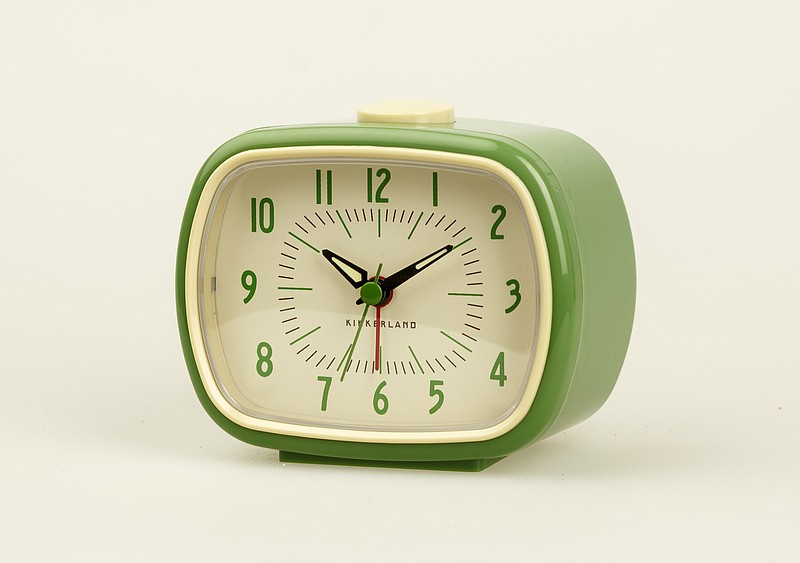The clocks struck 2 a.m. Sunday morning and fell back an hour to standard time, but while summer-sun lovers mourn the lost afternoon daylight, doctors and researchers say it may be better for our health.
Studies show that stroke and heart attack rates increased immediately after daylight saving time in March, but that's not the case when returning to standard time the first Sunday of November.
During the spring forward, the body has one less hour to prepare for waking up, which can cause inflammation and sleep deprivation and disrupt the internal clock, or circadian rhythm, said Martin Young, a professor in the division of cardiovascular disease at the University of Alabama at Birmingham School of Medicine.
Young, who researches how environmental factors - such as time of day - influence heart health, found that on the Monday and Tuesday after daylight saving in March, the risk of having a heart attack increased by 10 percent. He said more heart attacks on these days may be a result of the body not having adjusted to its new schedule.
"Imagine what your life would be like if you didn't know what time of day it was. It would be in disarray," he said. "Well the same is true for the cells in your body if they don't know what time of day it is, they can't anticipate or prepare for what's going to happen."
Dr. Suzannah Bozzone, a family medicine specialist at Erlanger North Hospital, is passionate about sleep health. She said studies like Young's point to a broader problem of sleep deprivation within our society.
"In this country, it's almost like we see sleep as a sign of weakness, but in fact it's one of the most important things that we can do for our health," she said.
More than a third of adults in the United States report insufficient sleep, which is less than seven hours of sleep per day, according to the Centers for Disease Control and Prevention.
But Bozzone said the prevalence of too little sleep is likely under- reported, and when more sleep is lost during daylight saving, the effects can be detrimental.
The CDC links sleep deprivation to numerous negative health outcomes, including an increased risk for chronic diseases, such as heart disease, stroke, obesity, diabetes and depression. Researchers also blame accidents on a lack of sleep, particularly following the spring time change.
Lt. John Harmon, a spokesman for the Tennessee Highway Patrol, said that driving while tired is a safety issue, and when busy schedules, high traffic volumes and distractions are thrown into the mix, it can be a recipe for disaster.
"You need to be totally focused on driving without the possibility of falling asleep," he said. "When a driver has the appropriate amount of sleep and uses the basic fundamentals of driving - hands on the steering wheel, eyes on the road and limits their distractions - they have a better chance avoiding a crash."
Bozzone compared drowsy driving to drunken driving, citing a study from 2000 in the journal Occupational and Environmental Medicine that found drivers' impairment after 17 to 19 hours without sleep was comparable to a blood-alcohol content of 0.05 percent. Longer periods without sleep caused impairment levels equal to 0.1 percent BAC, which is over the legal limit.
"If we're operating like basically we're intoxicated, there's significantly higher rates of work-related injuries and car wrecks," she said. "At least if you're drinking alcohol, you maybe think twice before you drive a car. But when you don't sleep enough, you just get in your car and go."
While there are many factors that affect sleep quality, Bozzone said the way we're exposed to light nowadays is a primary culprit.
Melatonin is the main hormone the body produces to control sleep, and it starts to increase during darkness. But blue light from TVs, cellphones and computer screens significantly hinders melatonin production.
"A lot of people say, 'No I fall asleep in front of the TV,' but in fact it impairs your quality of sleep, and it absolutely impedes your ability for your body to regulate its own sleep cycle, because the melatonin can't surge," she said.
Kids and teens who enjoy late-night screen time may be particularly at risk for sleep deprivation, especially since their bodies need one to three more hours of shuteye than adults.
"When I deal with adolescents that really aren't sleeping enough and have ever-increasing anxiety and depression - because they have so much social stress on them right now - so often I find that they're up on their phones for hours, and they're just not getting to bed," Bozzone said.
Although falling back is an opportunity to catch some much-needed Z's, few people take advantage of the extra hour, Bozzone said, and anytime a sleep schedule is altered, our bodies must compensate.
But she also said there are ways to combat the negative impact of time changes and sleep better overall.
Bozzone recommends removing blue light 90 minutes before bed, doing something relaxing, like bathing or meditating, and limiting both caffeine and alcohol, which sabotage sleep quality. Some people also benefit from taking a melatonin supplement.
During the fall time change, taking an afternoon walk and eating your main meal three hours before bedtime can help to synchronize your body clock. Whereas in the spring, taking a morning walk and eating a heavier breakfast is a good idea.
These same principles can be applied when traveling between different time zones - treat going east like spring and west like fall.
Contact staff writer Elizabeth Fite at efite@timesfreepress.com or 423-757-6673.
